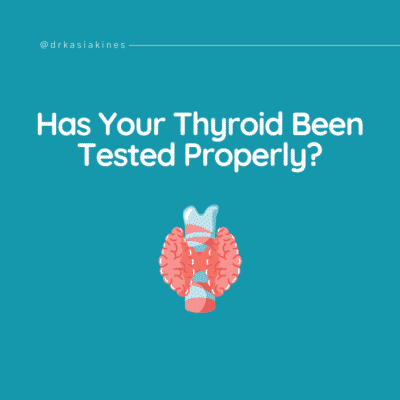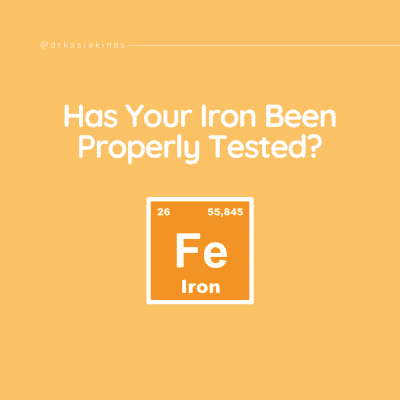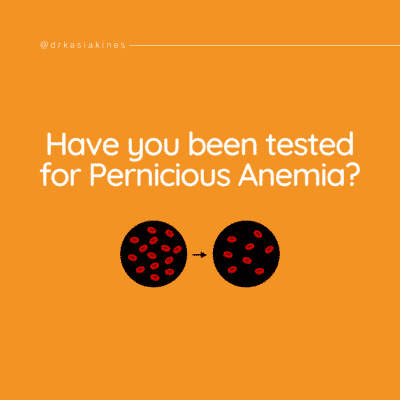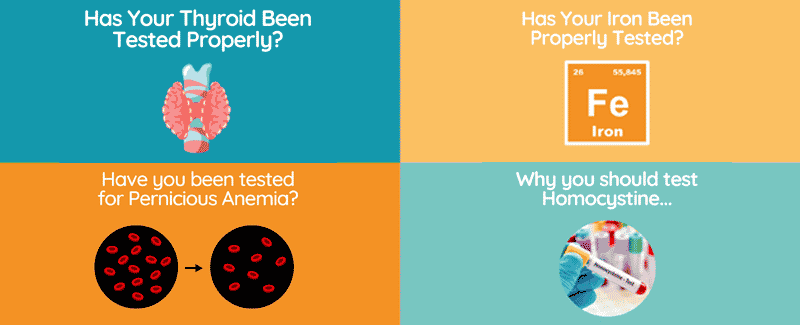Some people spend five to ten thousand dollars on functional medical tests trying to figure out what is wrong with them before they find out they have EBV.
Then there are traditional medical practices that use traditional testing only, and important things are sometimes missed as a result. I always find that people who heal best from their health challenges are those who advocate best for themselves, ask questions, and request what they need. Knowing the details I will share about tests that are often missed can literally change the trajectory of your healing journey.
Thyroid

What is tested: TSH, T3, T4. What is not typically tested and should be:
1. Reverse T3 (RT3): RT3 is seldom tested. Also, while the traditional range or “normal” is around 10-25, functionally, you want to keep it within 15 and not higher. If higher, it may indicate high stress, nfections, starvation, liver disease, inflammation, nutritional deficiencies and the list goes on. This RT3 will dock to the thyroid receptors on the cell BUT, unlike T3, it will NOT get inside the cell to perform the needed functions. It will just sit there. But it will block T3 from entering. This is possibly a way for the body to downregulate the spending of T3 if there is overdrive. Sleep support, stress support, slowing down, healing the infections… these all need to be looked at.
2. TPO antibody
3. Thyroglobulin antibody
Both #2 and #3 are very important. Here is why. We have an epidemic of low or subclinically low thyroid function in women (for various reasons). But some medical literature suggests that up to 90% and even more cases of low thyroid may in fact be Hashimoto’s Thyroiditis (HT) instead. HT is not low functioning or tired thyroid. It is thyroid that is attacked by your immune cells. It is an autoimmune condition.
Thyroid can trickle into autoimmunity for many reasons, including, gluten, selenium deficiency, or pathogens such as Yersenia, H. pylori, and EBV. Most people will only have one or the other of the two antibodies elevated, and that is enough to confirm HT.
Some of my colleagues who specialize in thyroid disorders in clinical practice have told me that these two antibodies should really be zero, one, or two, and not more, even if the number is within range. Whenever you retest your thyroid, ALWAYS insist on also testing RT3, TPO and thyroglobulin antibodies.
Iron

What is traditionally tested: Iron (Fe), Ferritin.
What you should request:
Most doctors only test iron or iron and ferritin. But in order to truly understand your iron status, you need a panel of five.
1. Iron (Fe) is only the snapshot of today’s iron level in your bloodstream. What did you eat today? Did you absorb that iron from your meals or did you not have much iron in your diet today?
2. Ferritin is a three-month storage of iron, which is vital to your long-term health. Ferritin is a much more important iron status than just Fe. Low ferritin is a challenge for many women and causes fatigue and hair loss. If your iron or ferritin or both are low, look for the root cause, e.g. hypo- or achlorhydria, EBV, pernicious anemia (more on next page), SIBO, leaky gut etc. Depending on the lab, the normal range can go from 11 to 300s. However, we recommend a level of 70 minimum for solid functions.
3. High ferritin and high iron – You may have hemochromatosis, especially if it is highly out of upper range. This is a genetically inherited disorder and all you need is to ask any doctor to test for it. If that’s what you have, you should be careful supplementing vitamin C and lysine as they increase iron absorption. The only remedy for hemochromatosis is blood transfusion, which people with hemochromatosis do periodically to keep well – easy enough.
4. Low ferritin – can be iron anemia. In that case, be very careful before you let your doctor do IV iron infusions—I have seen this backfire and send people into inflammatory hell, especially feeling their brain felt on fire for up to a few months. Iron infusions can also feed pathogens like candida, creating a fungal infection. Instead, seek to work with a clinician who will investigate why your ferritin is weak. Go for the root cause. Do you have hypochlorhydria/gastritis/H. pylori? Herbal iron supplements can be the safest. Dietary changes can support improving ferritin. The status of your intestinal lining should be assessed.
4. High ferritin and low iron – “Anemia of inflammation,” common with chronic inflammatory conditions… possible with EBV too. The solution is to decrease inflammation by finding the root cause of it!
Questions about your particular circumstance? I can answer them during Power Hour. Click the link to schedule an appointment with me.
Pernicious Anemia

All you need is a simple blood test for two antibodies that any doctor can test:
- Parietal Cell Antibody
- Intrinsic Factor Antibody
Pernicious anemia (PA), like Hashimoto’s or “anemia of inflammation,” can go undetected for years if not tested properly. It is actually very dangerous. I have unfortunately seen some tough cases of EBV only to find out that PA is part of the issue. And it can be devastating.
You only need one of these two antibodies elevated.
Pernicious anemia is an autoimmune disorder. In women, sometimes it manifests first as chronically low iron (see my post about iron – read the full caption), and most doctors would not even think of PA since many women have weak iron status.
PA occurs when your immune cells attack the cells in your stomach, parietal cells, and intrinsic factor. Without parietal cells your stomach cannot produce hydrochloric acid. Without intrinsic factor, B12 cannot be delivered from the stomach to the small intestine for absorption.
So you develop two major life-altering issues:
- Hypochlorhydria (low stomach acid) or in severe cases (which I have seen) achlorhydria (no stomach acid). Achlorhydria is life-threatening. Note: this can be triggered by various factors like H. pylori too. If you love research, here is a link to a case report on hypochlorhydria I published in a medical journal: https://www.ncbi.nlm.nih.gov/pmc/articles/PMC4991651/
A formal test to measure your stomach acid secretion is called Heidelberg test and unfortunately not many gastroenterologists offer it. It is worth looking for and traveling for if you are severely malnourished, have pain in your stomach area and can barely tolerate any foods. - B12 deficiency. This can be devastating and even mimic Alzheimer’s symptoms. Having both achlorhydria and B12 deficiency is a devastating combo. Unfortunately both are often missed.
You will have pain in the stomach, multiple food allergies, multiple gut infections, pathogenic infections, you may have weak bones, neurological symptoms, or brain cognitive deterioration. You can develop a stroke or a heart attack from high homocysteine… you may be constantly underweight. You may have nausea, vomiting, heartburn, abdominal bloating and gas, constipation or diarrhea, or loss of appetite. You may have an enlarged liver. A smooth, thick, red tongue is a simple sign of vitamin B12 deficiency, although some people develop a burning tongue syndrome instead. You may have symptoms that resemble celiac. Literally, your daily life will be challenging.
Bottom line: There is a simplified experiential home test for low stomach acid that is popular in functional medical practice and we educate on that in our community as well. As for B12, I recommend B12 test in blood serum, but I would also recommend Spectracell Lab Micronutrient test, which looks at the intracellular level of B12 in your lymphocytes rather than in your bloodstream – this is a longer term status and will tell you the truth about where your B12 is.
Homocysteine

Homocysteine (Hcy) is a marker that is rarely tested but should be in any person with a chronic or mystery condition. Since many people have genetic SNPs for folate and may have poor dietary sources of folate on top of that, testing and retesting Hcy is prudent. It is a simple blood test.
Hcy has important functions, but if your folate, B12 (see pernicious anemia), or B6 are low, Hcy can spike up, and when it does, it does as much damage to your arteries as your cholesterol plaque. It damages arteries and blood vessels and you can literally have a stroke or a heart attack with perfect cholesterol because of high Hcy alone.
While the normal range is up to 15, in one study every single person who tested 15, later developed Alzheimer’s disease. That is because Hcy has a free pass through your blood brain barrier into your brain and is extremely inflammatory to your brain, literally setting it on fire.
Keep your Hcy between 4 and 8. That would be ideal. If it is more than 8, test your B12, B6 and folate levels in a simple blood test and even if you don’t, simply take a good quality B complex that includes methylated forms of B12, B6 and folate.
Questions about your particular circumstance? I can answer them during Power Hour. Click the link to schedule an appointment with me.







Leave A Comment